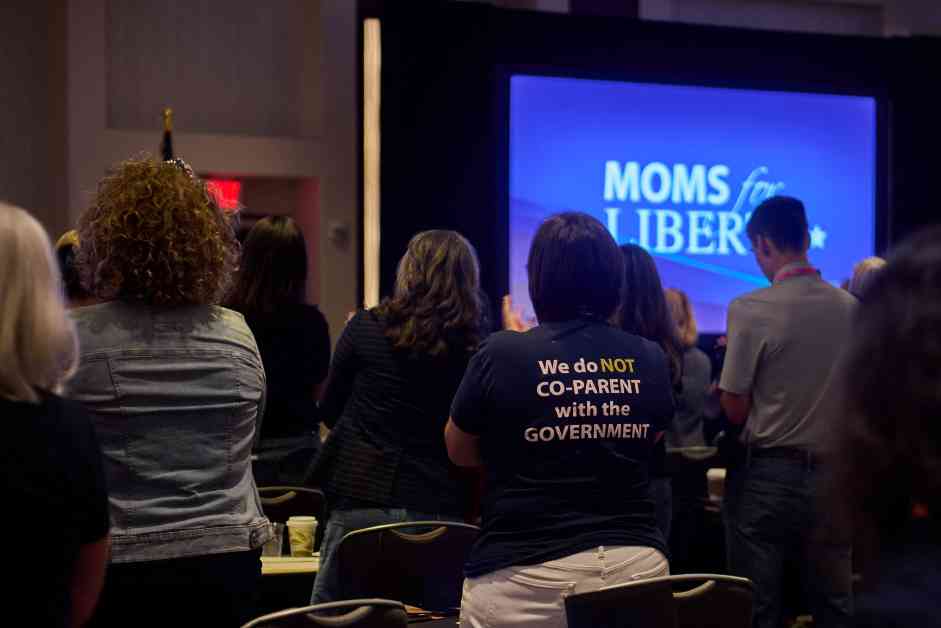Key Takeaways from Moms for Liberty Summit: Empowering Mothers for Change
Hechinger’s executive editor, Nirvi Shah, recently attended the Moms for Liberty summit and shared insights on how the organization’s focused efforts on transgender students influenced a temporary block on parts of President Joe Biden’s new Title IX regulations in certain states. The summit shed light on the complexities of Title IX regulations in schools, with different schools within the same district following varying federal rules. This disparity creates administrative challenges and underscores the confusing landscape schools navigate in adhering to Title IX guidelines.
The Reality of Title IX Regulations in Schools
Federal court rulings have temporarily halted the enforcement of the Biden administration’s sex discrimination regulations in some states, leaving individual schools exempt from being compelled to adopt the new rules. While local school boards can choose to adopt the regulations, the patchwork implementation of Title IX rules across districts adds to the complexity. Hechinger’s Sarah Butrymowicz developed searchable databases to track which colleges and K-12 schools are not bound by the Biden administration’s regulations, highlighting the fluidity of the situation with 1,700 schools added during the week of the Moms for Liberty summit.
Assessment of Moms for Liberty’s Strategy
Following recent setbacks in endorsing school board candidates, questions have arisen about the efficacy of Moms for Liberty’s influence. Despite these challenges, the organization remains committed to endorsing candidates for school board races as a key strategy to ensure local governance aligns with the preferences of parents and communities. Co-founder Tiffany Justice emphasized the importance of strong local school boards accountable to constituents, advocating for decentralized decision-making in education rather than federal oversight.
The Impact of Moms for Liberty’s Advocacy
Moms for Liberty’s advocacy efforts culminated in securing a federal court agreement to prioritize parents’ preferences on Title IX regulations at their children’s schools, marking a significant victory for local schools and engaged parents. The group’s targeted approach to influencing policy decisions underscores the power of grassroots activism in shaping educational practices and priorities. Justice reflected on the unexpected outcomes of their advocacy, emphasizing the organization’s commitment to amplifying parental voices in education policy discussions.
Focus on Transgender Issues
A notable theme of this year’s Moms for Liberty summit was the organization’s heightened focus on transgender issues in schools. Transgender rights and inclusion emerged as central topics in speeches and breakout sessions, signaling a shift towards a more specific advocacy agenda. Justice’s perspective on transgender issues emphasized the importance of supporting children experiencing mental distress with kindness and compassion, challenging conventional narratives around gender identity and affirming the diversity of individual experiences.
Exploring Education Initiatives Across the Nation
In an era of evolving educational landscapes, initiatives like the opening of New Orleans’ first traditional school post-Hurricane Katrina and the integration of climate-related instruction in college curricula reflect ongoing efforts to enhance learning environments. Despite substantial federal funding for tutoring during the pandemic, studies revealing limited academic gains underscore the need for targeted interventions to address learning loss effectively. The transparency of state school report cards in documenting the impact of COVID-19 on student performance remains a critical area for improvement in educational accountability.
Addressing Equity in Education
Efforts to promote equity in education, particularly for English learners, highlight the significance of inclusive practices and diverse instructional approaches. Aligning teacher demographics with student populations and prioritizing dual language immersion programs can enhance academic outcomes for English learners, emphasizing the importance of culturally responsive education strategies. Digital equity initiatives aimed at bridging the technology gap for underserved student populations underscore the critical role of schools in ensuring equitable access to resources and opportunities for all learners.
Public Perception of Education Policies
Public opinion on contentious education issues, such as school vouchers, historical curriculum content, and LGBTQ+ inclusion, reflects a diversity of perspectives on the role of education in shaping societal values and knowledge. The ongoing debate on educational priorities underscores the need for inclusive and comprehensive approaches to curriculum development and instructional practices. Understanding public attitudes towards education policies is essential for fostering constructive dialogue and informed decision-making in educational governance.
Reflections on Student Technology Use
The evolution of policies surrounding student technology use, particularly regarding cell phones in schools, highlights the challenges of balancing educational innovation with classroom management. Recent trends in restricting cell phone access in schools underscore concerns about distractions and behavioral issues associated with technology use. Addressing ethical implications of mandating digital devices for students and holding parents accountable for damages signals a broader conversation on responsible technology integration in educational settings.
Supporting Independent Journalism in Education
The coverage of Moms for Liberty’s advocacy efforts by The Hechinger Report exemplifies the organization’s commitment to unbiased, fact-based reporting on education issues. As a nonprofit news organization dedicated to addressing inequality and innovation in education, The Hechinger Report relies on reader support to sustain its comprehensive coverage of critical issues in education. By staying informed and engaged with educational developments, readers can contribute to a more informed and equitable education landscape for all learners.
In Conclusion
The Moms for Liberty summit offered valuable insights into the organization’s advocacy priorities and strategies, highlighting the impact of grassroots activism on education policy decisions. By prioritizing parental voices and community engagement, Moms for Liberty has demonstrated the power of localized advocacy in shaping educational practices and priorities. As schools navigate complex regulatory landscapes and evolving educational trends, the need for inclusive and equitable approaches to education remains paramount. By supporting independent journalism and staying informed on education issues, readers can contribute to a more transparent and responsive education system that prioritizes the needs of all learners.


